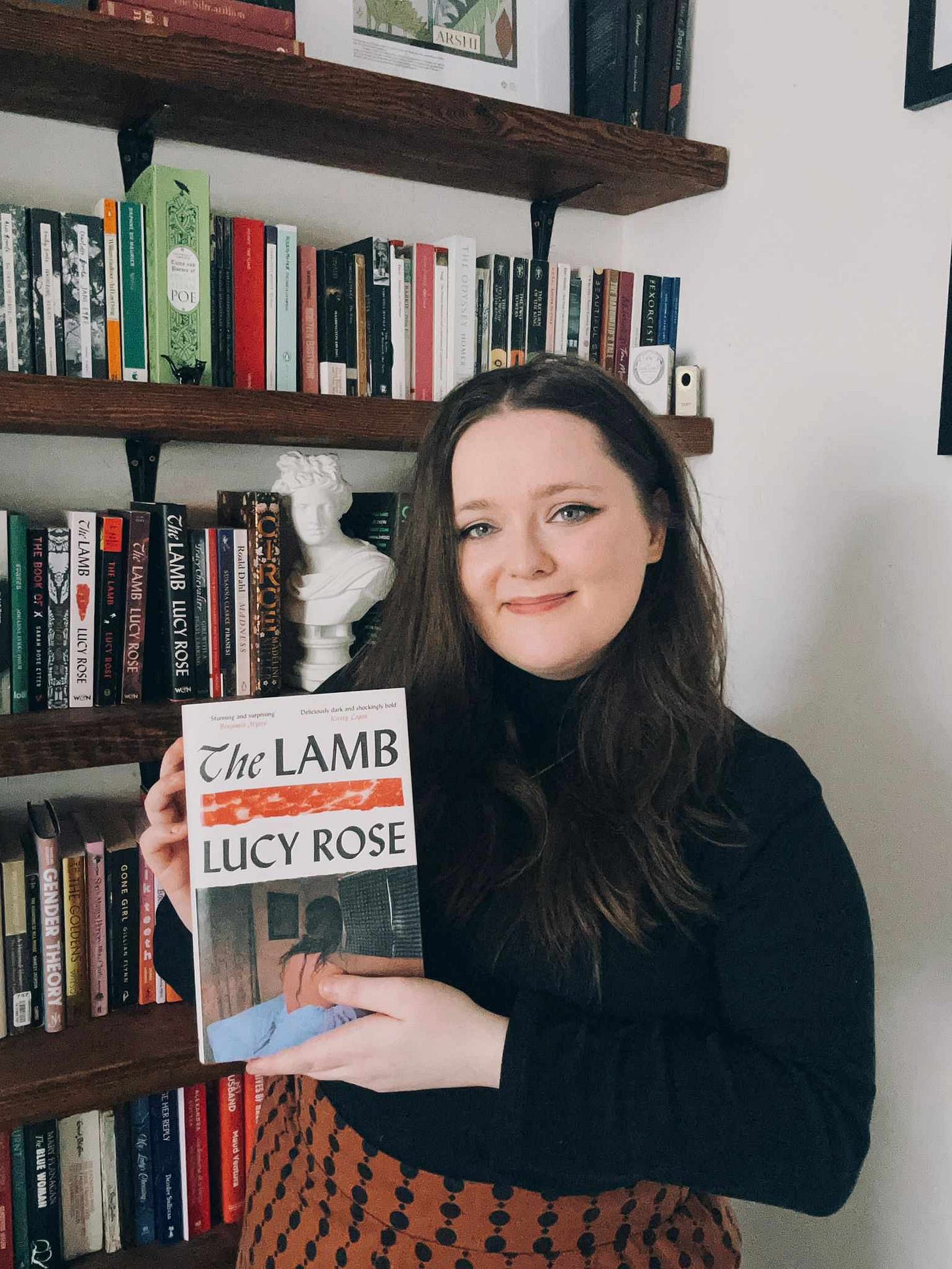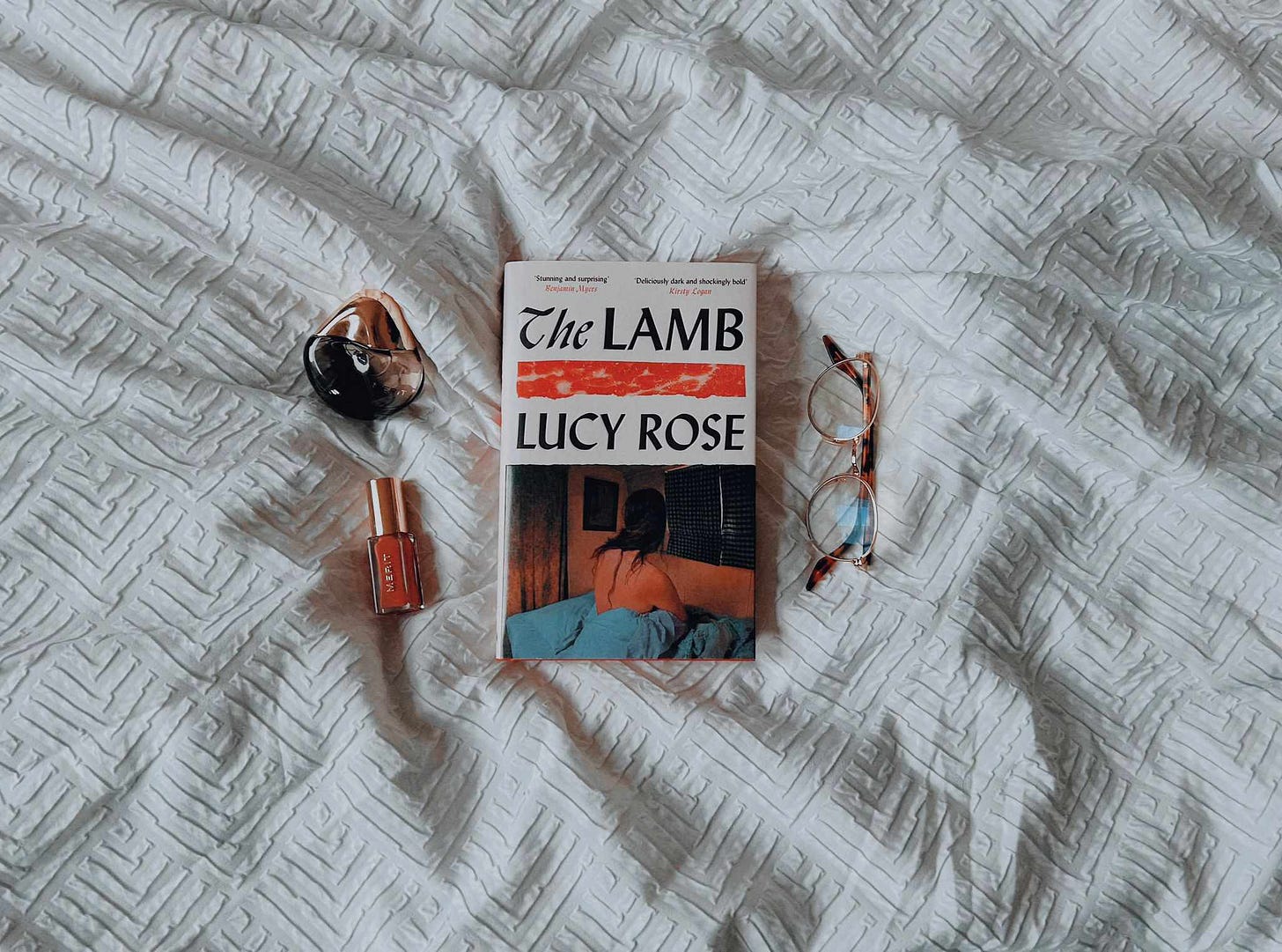You might not be able to write the way that other people do and that's okay.
Lucy Rose's (neurodivergent) notes on writing
I’m so excited that the very first edition of (Neurodivergent) Notes on Writing is with none other than the fantastic, Lucy Rose. One of the things that has helped me most on my journey as a writer is building a community of other writers to talk to, and I’m very grateful to have connected with another neurodivergent 2025 debut like Lucy (especially when both our books have so many gothic, bi, ND vibes…) who has so many valuable, generous insights to share.
Lucy’s shared her thoughts here not only as a writer but also as a publishing professional. Her advice is reassuring and honest, and her thoughts on how the industry can be more accessible focus on improving things for everyone.
Hey Lucy! Tell us a bit about you and your work.
My debut novel, The Lamb, is a contemporary folktale about mother and daughter cannibals. It explores hunger and desire in women, it has bisexual awakenings and themes of autonomy and agency - that is generally my vibe ha.
I've always really been into campfire stories and that's an influence on my work. They're the stories I remember most from childhood because they evoke the strongest emotional memories. I remember the childlike feeling of fear - the physical manifestation of it (goosebumps, sweats, high heart rate, hypervigilance), it was such a powerful feeling. It's fascinating that words can have such a profound impact on our physical senses.
Does being neurodivergent impact your creative process? And if so how?
Yeah, for sure. It might sound obvious, but it disables me. I think people forget that ADHD and autism are disabilities and aren't always cute and colourful. I was diagnosed later in life, and so I'm only now learning the tools I need to survive. I'm only just learning how to be able to sit down and focus in the way I need to in order to write a book.
In my debut novel, The Lamb, that physical practice shows in the writing: The chapters are short and fragmented because that's all I could manage. I get distracted easily, have very high fatigue and experience extreme bouts of paralysis. Writing in short bursts was truly the only way for me to finish a book.
Is neurodiversity a theme in your work?
Some of my characters are neurodivergent, for sure. They reflect the very specific loneliness and isolation we feel as people with neurodevelopmental disorders. However, especially in the case of The Lamb (which is about a teenage girl), there is no name to put to that ardent feeling of loneliness or feeling othered because that was my lived experience. I wasn't diagnosed until my adulthood, which contributed in a big way to the feelings of isolation I experienced. There were no words to describe the feelings in my body. There was only the feeling itself.
What's one piece of advice would you give to aspiring neurodivergent writers out there?
Don't try to fight against your instincts. You might not be able to write the way that other people do and that's okay. Especially if you're the flavour of neurodivergent where you're not able to produce work very quickly, it can feel horrible. It's all sorts of triggering. When I get into that headspace of feeling like I'm falling behind, I remind myself what success looks like to me personally and focus on that. One of my mentors told me this: focus on the current project. Focus on the current moment. And that has always really stuck with me.
Is there a book (or other kind of art) by a neurodivergent artist that you love and you'd like to draw our attention to?
Not specifically autism, but Earthlings is one of those profound novels where every autistic person I know has read it and said: That's it. That's the feeling. And though it doesn't describe the experience of autism directly, it does an excellent job of articulating the nuanced feeling of it.
What’s one thing the publishing industry could do to make things better and more accessible for neurodivergent writers?
Communication.
I work in publishing by day and understand first-hand how ambitious and busy it is. Every minute of my day is so precious, and even bobbing off an email does take up valuable time. So I think while the solution is to have utter clarity and communication between publishers and authors (and that would go such a long way), it isn't really that simple. It's quite reductive for the solution to be 'send me more emails on things that are happening (and aren't happening).'
For me, the solution would be to have an increased workforce (who are fairly paid for their labour) and well-maintained support networks within publishing companies, so the employees are looked after and rewarded for their work. Healthy, enthusiastic and well-looked-after publishers can be more meaningfully supportive of their authors. That's my take, anyway.
And lastly, how can readers of the newsletter support your work?
Come find me on socials! I'm at @LucyRoseCreates on TikTok, Instagram and Bluesky - if you're feeling extra generous, you can pre-order my cannibal folktale book here.






Hugely relatable! Especially the fragmentation of scenes and chapters. My first novel was like that. Thankfully most people seemed to like it and said it was more addictive and they didn't want to put it down. I wrote it before I was diagnosed and now it seems so obvious, but back then I still had no idea!